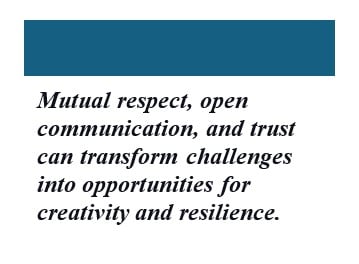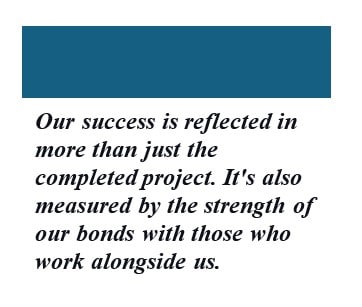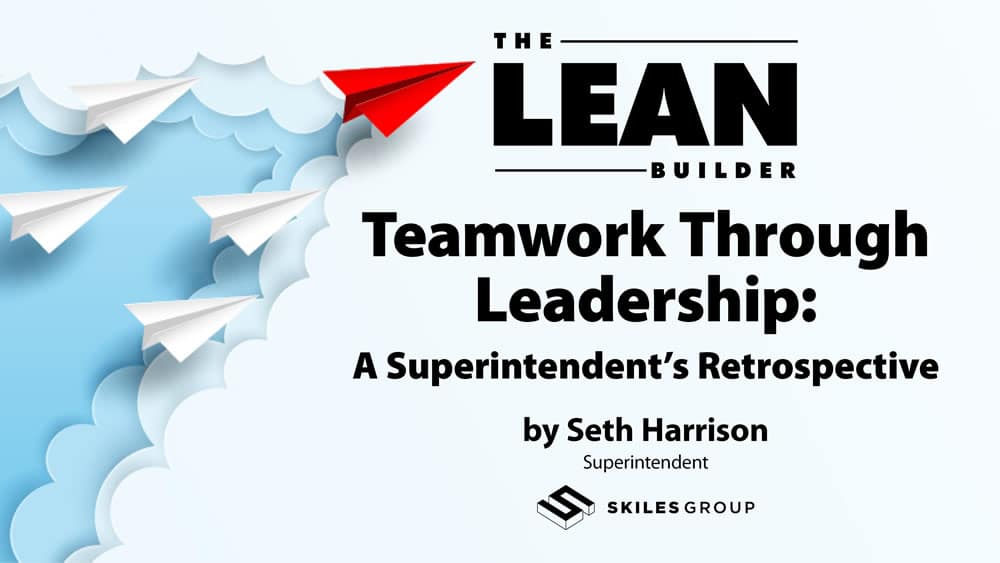Explore the importance of teamwork through leadership in construction projects. Discover how effective communication & mutual respect can lead to project success.
Teamwork Through Leadership
Every construction project is a symphony of people and moving parts coming together to create things: bridges, buildings, roadways, and more. In this hectic, tense environment, the relationship between a superintendent and the trade partners can make or break a project. Reflecting on my journey in the industry, I’ve realized how profoundly these dynamics have shaped my career.
Mutual Respect
During my first major project, I oversaw the construction of a multi-story medical office building with various finish-outs. The project was expected to take over a year to complete. Feeling both eager and somewhat anxious, I decided to spend the initial days walking through the site and talking to each team member. I took the time to listen to the stories, concerns, and ideas of everyone involved, from the seasoned electricians to the fresh-faced apprentices.
Even so, when looking back, I realize that there were moments when I failed to show someone the respect they deserved. These regrets are strong reminders to be more mindful of my actions and their impact on others. Over time, these missed opportunities have deepened my understanding of the importance of mutual respect in nurturing positive relationships and fostering a supportive work environment.
The Art of Feedback

This project has also helped me learn the art of giving and receiving feedback. Initially, I was hesitant and afraid that criticism might lead to resentment. However, I realized that when feedback is delivered thoughtfully and constructively, it can transform a project and cultivate a culture of continuous improvement.
I remember receiving feedback from a young but sharp assistant project manager, who pointed out areas where I could improve my communication style. Initially, I felt defensive, but I stepped back and listened. Integrating his suggestions improved our efficiency and strengthened our bond as a team. Midway through the project, we hit a snag—a critical delivery was delayed, threatening our timeline. Tensions rose, and the pressure was palpable. But our team came together; we trusted each other’s abilities and communicated openly, brainstorming solutions late at night. Our lead electrician proposed an ingenious workaround that involved re-sequencing tasks. It was a risk, but we trusted their expertise. Their solution kept us on track and brought the team closer.
Empathetic Leadership
 During the project, we held several feedback sessions, and the feedback I received was essential for my development as a leader. The perspectives shared by my team members were eye-opening, as they highlighted my strengths and especially areas for my improvement. Seeing these examples of how my actions and behaviors affected others—for better or worse—reinforced the significance of leading with empathy, humility, and respect.
During the project, we held several feedback sessions, and the feedback I received was essential for my development as a leader. The perspectives shared by my team members were eye-opening, as they highlighted my strengths and especially areas for my improvement. Seeing these examples of how my actions and behaviors affected others—for better or worse—reinforced the significance of leading with empathy, humility, and respect.
I also think of mentors I’ve had who have exemplified empathetic leadership. They made it a point to acknowledge every team member’s effort, big or small. Watching them, I learned the importance of empathy, integrity, and appreciation. Inspired by their example, I strived to embody these values in my interactions with trade partners and stakeholders. I sought training programs on emotional intelligence, communication skills, and effective leadership. These programs helped me cultivate stronger, more respectful relationships with my team.
You Can Start Today
In the end, our success is reflected in more than just the completed project. It’s also measured by the strength of our bonds with those who work alongside us. Focus on creating a solid team culture first, and the project’s success will follow. Here are a few simple ways you can start building better relationships with the people on your jobsite right now:
- Active Listening: Be intentional about paying close attention and listening to what the other person is saying without interrupting or formulating your response. Show empathy and understanding by reflecting what they’ve said back to them and asking clarifying questions.
- Communicate Openly: Be transparent and honest in your communication. Express your thoughts, feelings, and expectations clearly, and encourage others to do the same.
- Express Appreciation: Show gratitude and appreciation for the other person’s presence, efforts, and contributions. A simple thank you, or a heartfelt compliment can go a long way in building positive relationships.
- Make Time for Quality Interactions: Prioritize spending quality time together, whether it’s through regular conversations, shared activities, or meaningful experiences. These regular interactions strengthen bonds and nurture relationships.
- Resolve Conflicts Constructively: Address conflicts and disagreements calmly and respectfully. Focus on finding solutions rather than placing blame, and be willing to compromise when necessary.
- Celebrate Successes: Acknowledge and celebrate the other person’s achievements and milestones. Show genuine enthusiasm and support for their accomplishments.
Be sure and follow Seth Harrison on LinkedIn!









